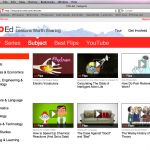
Technology can extend a talented teacher’s reach to thousands or even millions of kids around the world, said Chris Anderson, curator of the nonprofit TED project—and during an education conference in Boston, he described how the newly created TED-Ed website is doing just that.
TED, which stands for Technology, Entertainment, and Design, is a global set of conferences created to disseminate “ideas worth spreading.” Its open-access website, www.ted.com, publishes TED Talks in video format for anyone to watch.
TED has launched a version of the site for education, TED-Ed, that includes a number of useful tools designed to help educators incorporate the videos into their instruction.
At the opening general session of the 2012 Building Learning Communities (BLC) conference, hosted by ed-tech thought leader Alan November and his consulting firm, November Learning, attendees learned how TED-Ed is making an impact on education in just its first few months—and they also got a preview of what’s in store for the site.
Anderson said TED-Ed offers teachers a “magic blackboard” that pairs them with animators to create a six-minute video of their best lesson. Teachers submit their ideas to the site’s administrators, who then choose which lessons will be converted into animated videos.
“We live in a world where one teacher’s voice can spread out throughout the world,” Anderson said—and students worldwide can learn from the best teachers in each subject.
In a demonstration, Anderson showed a short snippet of a video created by teacher Aaron Reedy, who explained how the sex of a clownfish isn’t determined until later in its life. He then shared a tweet from Reedy that speaks to technology’s power to amplify instruction: “7 years as a teacher: I explain sex determination to 1,000 students. 3 days w/ TED-Ed: I have explained it to 13,000!” (As of press time, Reedy’s video reportedly has been viewed nearly 750,000 times in all.)
But technology doesn’t just amplify ideas, Anderson said: It also can boost instructional time.
“This is why the idea of flipped learning has gotten so many people excited,” he said, noting that when students watch lessons outside of class, it frees up the teacher to lead a deeper discussion or exploration of concepts during class time. And TED-Ed contains a number of features to help educators do this.
While watching a video, for instance, users can take a quiz to check their understanding of the video’s content. Answering a question wrong points the user to the part of the video that explained that particular concept.
But the most useful feature for educators, Anderson said, is a “Flip This Video” button that allows teachers to take any of the videos, customize them by changing the title, adding an introduction, and/or writing new questions for students to answer, then publish the video to a unique URL they can share with students.
Because the videos are published to a unique URL, educators can track how many of their students have watched the video and how many questions they got right, and they can see which questions their students got wrong.
Logan Smalley, a former special-education teacher from Athens, Ga., runs the TED-Ed website. Smalley took the stage during Anderson’s keynote to talk about how he’s seen educators use the site in the few months it’s been live.
“One of the things I’ve come to see TED-Ed as … is a platform for capitalizing on these teachable moments,” he said.
He told a story of how one of his days as a teacher had been hijacked by students’ excitement at the thought that someone had seen a UFO fly over Athens. Had he had access to TED-Ed at the time, Smalley said, he could have chosen a video titled “Calculating the Odds of Intelligent Alien Life,” by Jill Tarter, who was the inspiration for Jodie Foster’s character in the movie Contact, and assigned it to his students—asking them to use Drake’s Equation to explain whether they think the object was really a UFO.
Smalley said he’s also seen teachers ask students to create their own lessons from the videos, with the idea that students can learn from teaching others.
A new feature that was just added to the site in the last few weeks is a “Best Flips” tab, which takes educators to a collection of exceptional, user-created lessons, nominated by other users and chosen by the TED-Ed staff. In a development that is coming soon, Smalley said, users will be able to customize these Best Flips as well.
Other enhancements on the way include a “Discuss” feature for fostering public or private discussion of a video’s content; a “Translate” feature for translating video content into other languages; and a “Speak” feature that will allow users to respond to videos with audio or multimedia, and not just text. In addition, the site will link series of lessons on similar topics into playlists for users.
“A huge amount hinges on that moment when a student’s curiosity can be sparked,” Anderson concluded—and TED-Ed is another tool that educators can use to spark it.
- Can technology help schools prevent AI-based cheating? - April 14, 2023
- How to ensure digital equity in online testing - July 6, 2022
- ‘Digital skills gap’ threatens innovation - May 30, 2022

Comments are closed.